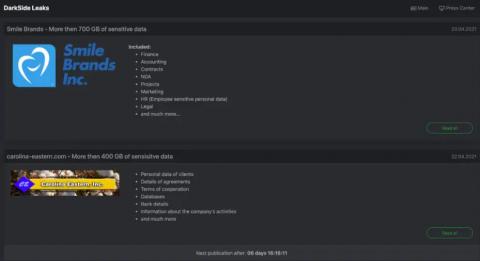Security | Threat Detection | Cyberattacks | DevSecOps | Compliance
Security
Misconfigurations, known unpatched vulnerabilities, and Cloud Native Application Security
Two weeks back, we published our annual State of Cloud Native Application Security report. If you haven’t seen it yet, here’s a TL;DR. We surveyed nearly 600 developers and security professionals to see how the shift to cloud native (digital transformation) has changed their security posture. Then we parsed the results, gleaned valuable insights, and put them in an interactive webpage.
1Password Developer Fireside Chat: Intro to Nom Parsers, Part 1: Fundamentals
1Password Developer Fireside Chat: Intro to Nom Parsers, Part 2: Building a JSON Parser
What the White House's Cybersecurity Executive Order Gets Right-And What We'd Like To See More Of
Netskope applauds the White House’s Executive Order on Improving the Nation’s Cybersecurity, especially the rigor with which short-term deadlines and some clear-cut plans of action are described. DarkSide ransomware and the attack on the Colonial Pipeline is just one recent example of events that have disrupted national critical infrastructure and put the privacy and safety of millions of individuals at risk.
3 actions to take based on the Colonial Pipeline ransomware attack
Ransomware has been a thorn in the side of cybersecurity teams for the past several years. As other security threats have come and gone, this insidious threat has been a constant challenge for every organization. This past year has proven to be especially profitable for ransomware operators, as major organizations like United Health Services, Orange and Acer have fallen victim to these attacks.
Ghosts in the Machine - OT and IT Convergence
There is a saying in cybersecurity that “Data is the new oil.” If that is true, then that oil is powering not only the economy but also industry. The term ‘Industry 4.0’ refers to the fourth industrial revolution where traditional manufacturing and industrial processes are increasingly using IT and data to the point that we’re now seeing the emergence of ‘smart factories.’
Cybersecurity Training: Raising Awareness And Securing Your Business
Organizations are increasingly faced with threats from sophisticated criminal organizations and nation-state actors. To mitigate the risks posed by cyber criminals, organizations must secure and protect their proprietary and sensitive information. They must also commit to training their employees to do their part to protect proprietary and sensitive information.
What's new in the 2021 'Open Source Security and Risk Analysis' report
As the use of open source has grown, so has the number of vulnerabilities. Uncover the latest findings from the 2021 OSSRA report. Open source libraries are the foundation for every application in every industry. But paralleling the popularity of open source is a growth in risk—specifically around open source licensing, security, code quality, and especially open source sustainability.
DarkSide Ransomware: Splunk Threat Update and Detections
The ransomware campaign against the Colonial Pipeline highlights the dangers and real-life consequences of cyberattacks. If you want to understand how to use Splunk to find activity related to the DarkSide Ransomware, we highly recommend you first read “The DarkSide of the Ransomware Pipeline” from Splunk’s Security Strategist team. In short, according to the FBI, the actors behind this campaign are part of the “DarkSide” group.










